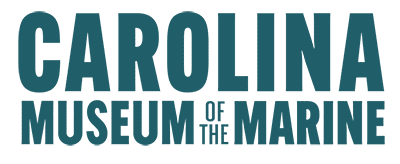Front and Center Vol-1 No 8 August 2022-Meet our CEO
FRONT AND CENTER
Vol. 1, No 8, August 2022
Mission
Honoring the legacy of Carolina Marines and Sailors and inspiring future generations.
Meet Kevin Stewart, CEO
Carolina Museum of the Marine

Brigadier General Kevin Stewart, USMC (Ret), has been appointed by the Board of Directors of Carolina Museum of the Marine to serve as the organization’s chief executive officer (CEO) after a nationwide search process. General Stewart will start with the organization on September 6, 2022.
“General Stewart is an exceptional leader,” said Mark Cramer, acting chair of the board of directors. Cramer served as the chair of the organization’s CEO search committee which convened in November 2021. “We had some excellent candidates,” Cramer continued. “General Stewart truly stood out. He is a Carolina Marine whose commitment to our mission is undergirded by growing up in a Marine Corps family including living and going to school at Camp LeJeune followed by more than thirty years of service in the United States Marine Corps.”
Stewart retired from the United States Marine Corps in 2021 as the Director, Global Operations Center, U.S. Transportation Command. He most recently was Director of the supply chain operations center at Anglicotech, LLC a veteran owned small business. His billets immediately prior to U.S. Transportation Command included Commanding General of 2d Marine Logistics Group at Marine Corps Base Camp Lejeune and Chief of Staff for the Deputy Commandant for Installations and Logistics, HQ USMC. Stewart served in both Iraq and Afghanistan.
Stewart’s roots in North Carolina go beyond the Marine Corps. He holds a degree in business administration from North Carolina State University and he attended the Advanced Program at the Center of Excellence in Logistics and Technology at the University of North Carolina at Chapel Hill. Stewart also holds master’s degrees in Information Technology Management from the Naval Post Graduate School and in Supply Chain Management at Pennsylvania State University
“The mission of Carolina Museum of the Marine is of critical importance to our Marines, their supportive local communities, the State of North Carolina, and our nation’s citizens,” Stewart said. “I am honored to be chosen for this position and excited about the opportunity to lead this effort.”
Understanding the Complexity and Uniqueness of the History of the United States
James Danielson, PhD
By Tysto – Own work, Public Domain https://bit.ly/3AzY0a4
The Canadian philosopher George Parkin Grant has observed that Canada and the United States are two countries of European origin with no history before the modern period. In the United States, this fact has led to an ongoing debate about when we began as a country. In considering this phenomenon, we should be clear that in any country, ours included, the study of history is not only an important exercise in cultural preservation, it is inevitably political. The politicizing of history was commented upon concisely in a well-known passage from George Orwell’s book 1984 in which one character remarks to another that those who control the past control the future. The story a people tell themselves about their past is a critical element in the health and well-working of a society. A people who celebrate their past and are proud of their country, mindful of mistakes, determined to improve, but proud nonetheless, will generally be happy and well-governed because they have a society they find worthy of protection and preservation.
It is an admirable quality of western societies generally, and particularly of English-speaking societies, that we examine ourselves to see how well we embody the ideals we espouse, and to seek to improve where we are deficient. Among the peoples of the world, this trait is rare. As fine a quality as this is, it can be carried to an extreme in ways that hold the real potential to be destructive rather than constructive. This constrained perception leads one to insist that a single aspect of the origin of a country, or an institution of society, or a religious faith, or a community, defines the entirety of it, for good or ill, and improvement and growth over time are futile – a position sometimes termed an origin fallacy. The history of the United States, however, strongly belies this fallacy due to our complex origins and the demonstrable progress in the continuing struggles to achieve our nation’s founding ideals.
An important aspect of our history concerns when the United States began as a country. Did we emerge in history as a country when the thirteen American colonies declared their independence from Great Britain? Did we come into being with the Articles of Confederation and Perpetual Union in 1781, with the present Constitution of the United States in 1788-89, or with the meeting of the first Congress under the Constitution? Should we seek our origins much earlier, at Runnymede in England in 1215, for example, where English noblemen compelled King John to acknowledge limits on his power that were grounded in their rights and codified in a constitution known as Magna Carta? This is a conversation Americans should engage in because it is important for the self-understanding of a people to know their origins in history and to talk about it, teach it, and celebrate it.
What is needed in this country is a revival of appreciation for our history and a wider willingness to celebrate the United States for its many excellent qualities and achievements, and importantly, to recognize the treasure that is citizenship in this country, which so many people around the world long to gain. We can get a good sense of this with only a few examples. To quote the Declaration of Independence: “…let Facts be submitted to a candid World.”
Purple Heart Day
by CWO5 Lisa Potts, USMC (Ret)
We pause to pay tribute to our brave Americans wounded or killed in defense of our great nation.
The Purple Heart is the oldest U.S. military award. It is also the most recognized military medal in American society. “The distinctive color and unusual shape…may be the reason Americans seem to recognize it more than any other military decoration – even the prestigious Medal of Honor.”[1]
By its authority, Americans realize the inherent debt and sacrifice to preserve our freedom and our way of life. A recognition of gratitude that General George Washington bestowed on his soldiers when he published the General Orders of the Day on August 7, 1782, to establish the Badge of Military Merit. Awardees were authorized to wear the heart shaped purple cloth badge over their left breast.
General John J. Pershing attempted to revive the award in 1918, but it was not until the bicentennial of the General Washington’s birth, that General Order #3 announced…
“By order of the President of the United States, the Purple Heart, established by General George Washington at Newburgh, August 7, 1782, during the War of the Revolution is hereby revived out of respect to his memory and military achievements.” signed General Douglas MacArthur.
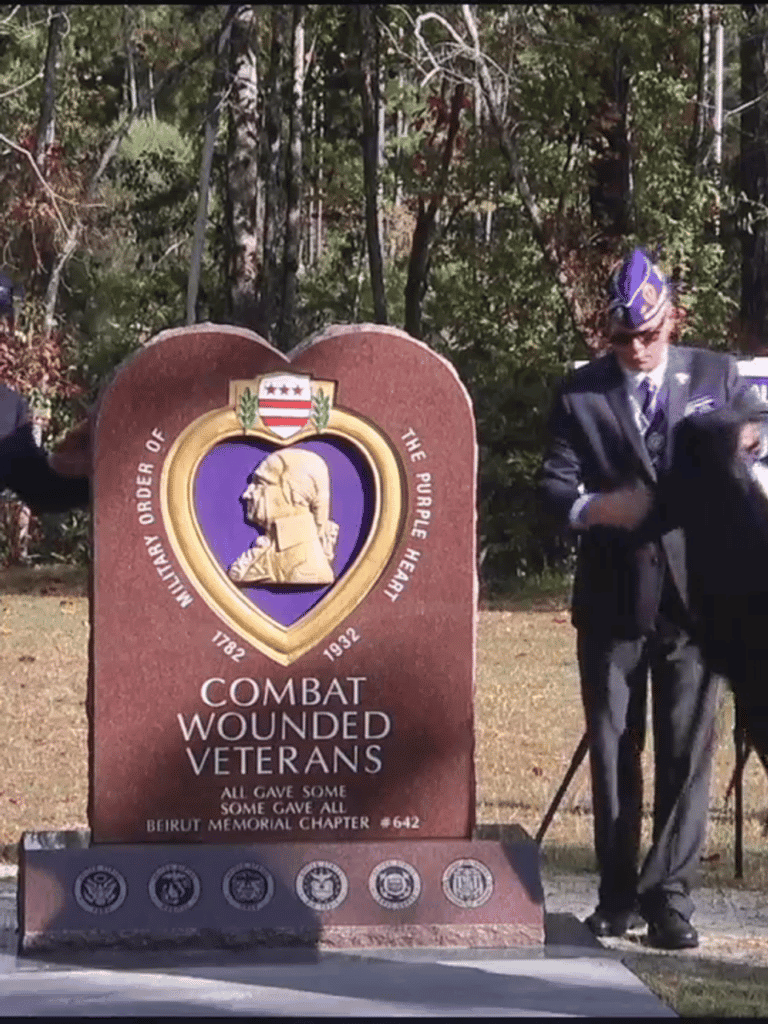
The medal designed by Elizabeth Will, an Army Heraldic Specialist, and sculpted by John R. Simcock of the Philadelphia Mint was approved by the Commission of Fine Arts in 1931.3 On May 28, 1932, 136 World War I veterans were conferred their Purple Hearts at Temple Hill, the site of the final encampment of the Continental Army in the winter of 1782-1783, a tradition that the National Purple Heart Hall of Fame continues today.4
In 1942, Executive Order 9277 authorized the entitlement for all branches of service, with many subsequent Executive Order amendments changing the criteria. Between February 1944 and March 1945, the Fourth Marine Division alone became entitled to 17,722 Purple Hearts. Following the Beirut bombing of the Marine Barracks in 1983, President Ronald Reagan expanded eligibility to include those serving in a peacekeeping force on or after March 28, 1973. North Carolina is honored to be home to the Beirut Memorial Chapter 642 of the Military Order of the Purple Heart, one of the largest chapters in the nation.
As of 2021, more than 1.6 million Americans have been entitled to the Purple Heart: World War I (257,404), World War II (962,403), Korean War (125,820), Vietnam War (248,151), Persian Gulf War (998) and the Global War on Terrorism (58,234).
Carolina Museum of the Marine is dedicated to preserving the rich heritage of those who serve.
[1] Fred L. Borch, “A Heart of Purple,” Prologue Magazine, National Archives (Winter 2012), 16.
[2] National Purple Heart Hall of Honor (thepurpleheart.com) (accessed August 15, 2022)
[4] Commission of Fine Arts, “Minutes of the Commission of Fine Arts.” September 24, 1931, Washington D.C.
[4] National Purple Heart Hall of Honor (thepurpleheart.com)
Tribute Bricks and Numbers!
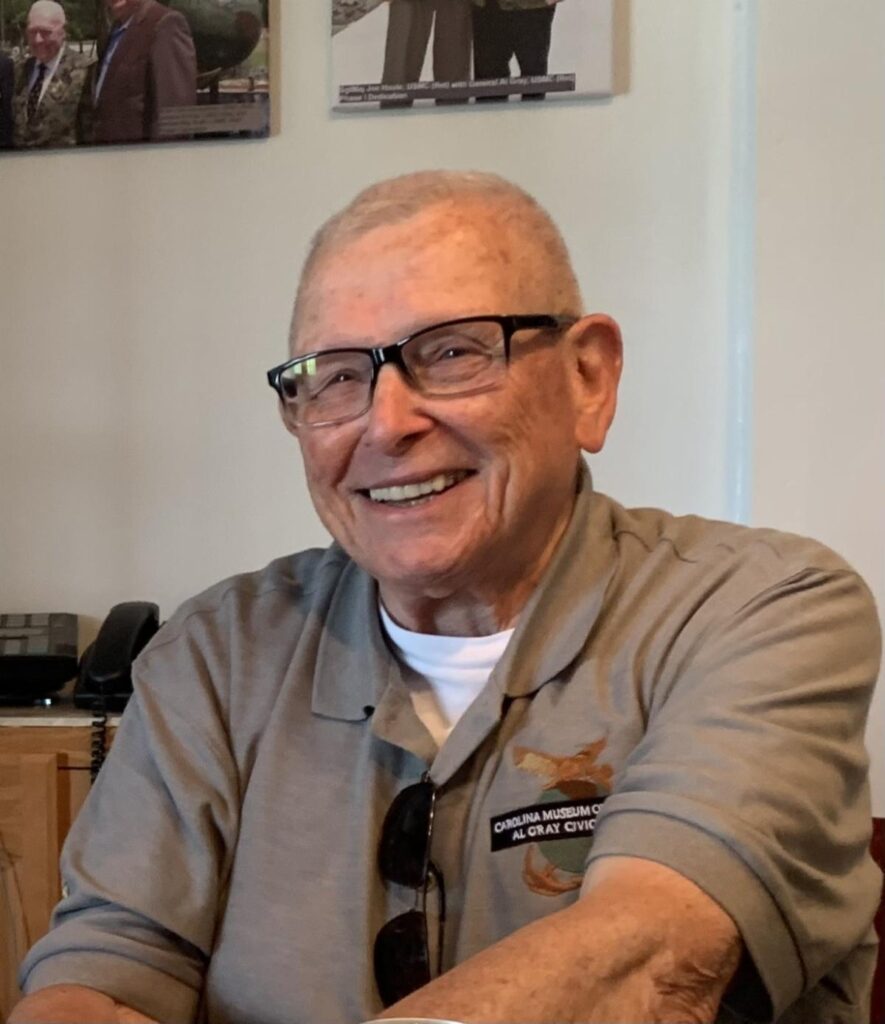
Meet Dick Koeckert, retired CPA and Army veteran, who is celebrating his 16th anniversary working with Carolina Museum of the Marine as accounting manager. Koeckert is a steadfast supporter of our mission. Throughout his tenure, he has been tireless in his commitment to getting the job done.
A familiar face at Museum special events where he wears a number of hats, Koeckert also singlehandedly oversees our Tribute Bricks and Benches program. Is it in his job description? No. But he took this on in our early days and faithfully ensures that each tribute properly honors the giver and the honoree. Tribute bricks may be ordered at the link below or by calling 910-937-0033 ext 13. Order here
CAROLINA MARINES
Marine Corps Base Camp Lejeune
Marine Corps Air Station Cherry Point
Marine Corps Air Station New River
Marine Corps Camp Geiger | Marine Corps Camp Johnson
Marine Corps Recruit Depot Parris Island
Marine Corps Air Station Beaufort
Marine Corps Auxiliary Landing Field Bogue
Marine Corps Outlying Field Camp Davis
Marine Corps Outlying Field Oak Grove
This issue of FRONT AND CENTER features
Marine Corps Auxiliary Landing Field Bogue

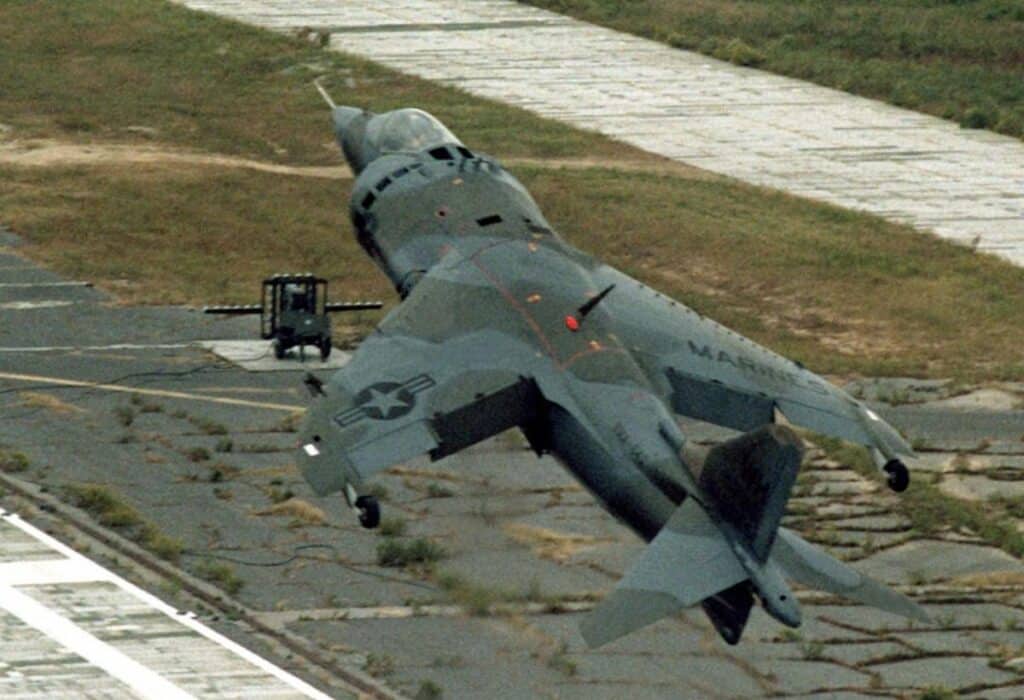
Marine Corps Auxiliary Landing Field Bogue (ICAO: KNJM, FAA LID: NJM), also known as Bogue Field, is an 875-acre (3.54 km2) landing field located on Bogue Sound (North Carolina) that serves as a Marine Corps’ East Coast site for Field Carrier Landing Practice (FCLP). It is a sub facility of MCAS Cherry Point in Havelock in Craven County and one of three USMC facilities in Carteret County. The others include Atlantic Airfield, a Cherry Point sub installation which is sparsely manned and Radio Island shipping terminal, between Morehead City and Beaufort, which falls under control of Camp Lejeune, though it is only manned during active military operations. Another USMC facility, Oak Grove Airfield, near Pollocksville in Jones County, is also controlled by Cherry Point and is rarely manned unless training is conducted there.
By Bogue Field being available for performing many of these landings at night, pilots simulate landing on an aircraft carrier or an amphibious assault ship, which provides the force with the means to forward deploy its aviation assets in order to have a more readily accessible aviation punch for the Marine Air Ground Task Force (MAGTF) commander on the battlefield. Wikipedia
Please join us in supporting the mission of
Carolina Museum of the Marine
When you give to our annual campaign, you help to ensure that operations continue during construction and when the doors open!
Stand with us
as we stand up the Museum!
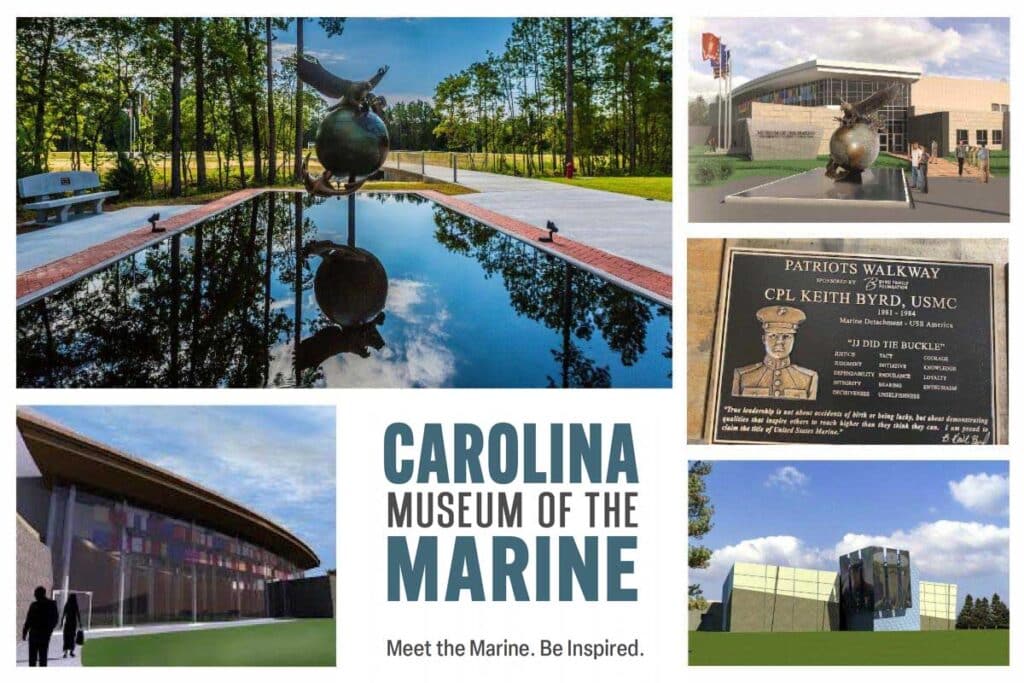
Copyright August 2022
Carolina Museum of the Marine
2021-2022 Board of Directors
Executive Committee
Mr. Mark Cramer, JD – Acting Chair and Vice Chair
CAPT Pat Alford, USN (Ret) – Treasurer
Col Joe Atkins, USAF (Ret) – Secretary
Col John B. Sollis, USMC (Ret) – Immediate Past Chair
General Al Gray, USMC (Ret), 29th Commandant – At-Large Member
LtGen Gary S. McKissock, USMC (Ret) – At-Large Member
Members
Mr. Terry Branton
Mr. Tom DeSanctis
MGySgt Osceola Elliss, USMC (Ret)
Col Chuck Geiger, USMC (Ret)
Col Bruce Gombar, USMC (Ret)
LtCol Lynn “Kim” Kimball, USMC (Ret)
CWO4 Richard McIntosh, USMC (Ret)
CWO5 Lisa Potts, USMC (Ret)
Col Grant Sparks, USMC (Ret)
GySgt Forest Spencer, USMC (Ret)
Staff
BGen Kevin Stewart, USMC (Ret), Chief Executive Officer
Ashley Danielson
SgtMaj Joe Houle, USMC (Ret), Operations and Artifacts Director
Richard Koeckert, Accounting Manager
Carolina Museum of the Marine is a nonprofit organization that is rigorously nonpartisan, independent and objective.
Carolina Museum of the Marine
907 Lejeune Blv., Jacksonville, NC 28540


